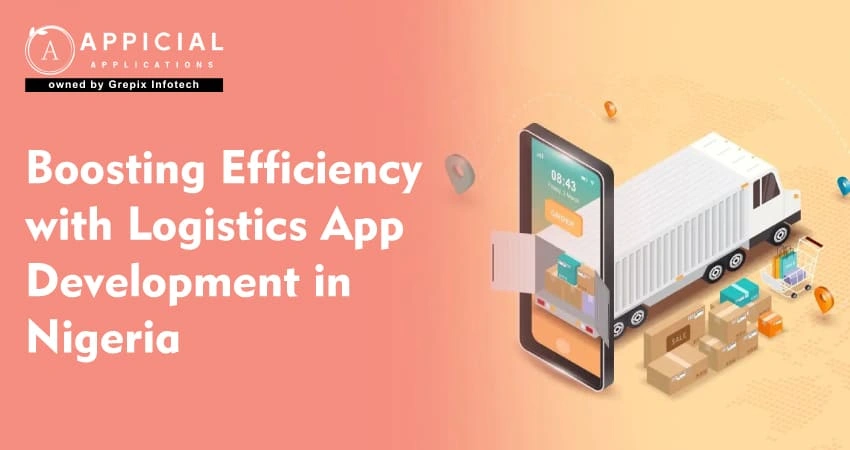
Boosting Efficiency with Logistics App Development in Nigeria
Let’s take an example to understand the importance of logistics app development! Chinedu runs a small delivery business in Lagos.
Every day, his drivers battle heavy traffic. Customers keep calling, asking, “Where is my package?” Paper records get lost. Orders get mixed up. Fuel costs rise because drivers take the wrong routes. Chinedu ends most days tired, chasing drivers on calls and replying to angry customers on WhatsApp.
One Friday, a big customer called him, upset that her order didn’t arrive on time. She said, “I can’t keep using your service if my customers keep waiting.” Chinedu felt the weight on his shoulders. He knew he needed a better way.
That weekend, he saw another delivery company using a delivery tracking app. Customers could track their packages live. Drivers got optimized routes to avoid traffic. Payments were tracked easily. No more endless calls to confirm deliveries. That delivery company was handling last-mile delivery with ease, keeping customers informed, and growing faster.
Chinedu realized technology was the missing piece. It wasn’t just about moving goods; It was about using supply chain tech to manage deliveries more intelligently. It was about tracking drivers, cutting down on fuel waste, and preventing late deliveries with fleet management.
Having a logistics app is no longer a luxury in Nigeria, where problems with traffic, bad roads, and operational chaos are commonplace. It’s a tool for survival and growth.
If you run a logistics or delivery business in Nigeria, you don’t have to keep struggling. A well-built app can transform your daily operations, reduce stress, and help your business handle more deliveries with fewer problems.
This guide will show you why logistics app development is a game-changer for your business in Nigeria, what features you need, how it opens new opportunities, what it will cost, and how Appicial Applications can help you build an app that fits your business and your customers’ needs.
Running logistics in Nigeria isn’t easy. Traffic slows down your drivers. Deliveries get delayed. Customers keep calling to ask where their packages are. Fuel prices go up, and you watch your profit drop every month. Managing drivers, vehicles, and customer complaints can leave you drained. You’re not alone in this struggle. Many delivery businesses across Nigeria face these same challenges every day. A well-built logistics app can help you turn things around. It can give your customers real-time updates with delivery tracking apps, so they know exactly where their packages are. Through fleet management, it can assist you in controlling your drivers and vehicles, reducing confusion and fuel waste. It can help you fulfill your commitments to customers by streamlining your last-mile delivery and cutting down on delays. You can clearly monitor your company's performance and make better decisions by utilizing supply chain technology. In this guide, you will see why now is the right time to invest in logistics app development in Nigeria. You’ll learn about the essential features you need, the opportunities this creates for your business, and what it will realistically cost to build your app. You will also discover how Appicial Applications can help you build a scalable logistics app that fits your business needs and keeps your customers happy, all without the usual stress that comes with deliveries in Nigeria.
Why Build a Logistics App in Nigeria?
Nigeria’s population is growing fast. E-commerce is growing too. More people are ordering things online. More businesses need to move goods across states.
But delivery delays are common. Manual processes slow down your work. Drivers waste fuel on bad routes. Packages get lost.
Building a logistics app is not about following trends. It is about solving real problems you face daily:
- Cut delivery delays.
- Manage vehicles and drivers using fleet management.
- Improve your last-mile delivery.
- Give customers clear updates with delivery tracking apps.
- Use supply chain tech to reduce mistakes.
When you build a logistics app, you reduce the daily stress of tracking orders by phone or WhatsApp. You can focus on growing your business, not chasing packages.
Essential Features of a Logistics App
Your app should not be complex. It should solve your every day delivery problems.
Here’s what you need:
- Real-Time Tracking
- Fleet Management
- Route Optimization
- Order Management
- Payment Integration
- Customer Ratings
- Push Notifications
- Analytics Dashboard
Customers see where their packages are. Drivers see their routes clearly.
Track your drivers and vehicles in one place using fleet management tools.
Drivers get the best routes to avoid traffic and delays.
Assign, track, and complete orders without endless calls or papers.
Collect payments online or let drivers collect with digital receipts.
See what customers think after deliveries. Improve your service with real feedback.
Notify customers when their packages are near.
Track delivery times, costs, and driver performance using supply chain tech insights.
These features help your last-mile delivery run smoother, which is where many logistics businesses lose time and money.
Opportunities in B2B and B2C Logistics
Logistics is challenging in Nigeria, but that also means there is a gap you can fill.
B2C Opportunities
E-commerce stores need reliable deliveries. They want delivery tracking apps that show customers where their packages are. If you provide this, you will get repeat business.
B2B Opportunities
Businesses need partners to move goods reliably. They need fleet management and better control over how goods move across states. If you provide this, you can serve manufacturers, retailers, and wholesalers who need better supply chain tech.
A logistics app helps you tap into both B2B and B2C opportunities, helping you scale without losing control over your daily operations.
Cost of Logistics App Development
“How much will it cost to build a logistics app?”
The cost depends on what you need:
- A simple delivery tracking app with real-time tracking and order management may cost between $8,000 and $20,000.
- A more advanced app with fleet management, route optimization, analytics, and payment systems can cost $25,000 to $70,000 or more.
You will also need to plan for:
- Ongoing maintenance and updates.
- Server costs.
- Upgrades as you scale.
Consider it an investment. Fuel expenses will be reduced, fewer deliveries will be missed, and fewer customer complaints will be filed. This will support your sustainable growth.
Also Read: Delivering The Future: Complete Guide On-Demand Logistic App Development
Case Studies or Regional Examples
GIG Logistics
GIGL uses technology to provide reliable delivery across Nigeria. Their use of delivery tracking apps allows customers to see their packages in real-time, reducing complaints.
Kobo360
Kobo360 connects truck drivers with businesses using fleet management and supply chain tech. This helps them reduce empty truck returns and improve efficiency.
Local Courier Example
A small Abuja courier started using an app to manage last-mile delivery for e-commerce businesses. They moved from handling 10 deliveries a day to 50 by reducing confusion and improving communication with customers.
These examples show that you don’t need to be a big company to benefit from logistics app development in Nigeria. Even a small courier business can use an app to boost efficiency and customer trust.
How Do Appicial Applications Deliver Scalable Logistics Apps?
At Appicial Applications, we understand the real challenges of logistics in Nigeria. From Lagos traffic to poor road networks, we build logistics apps that work in these conditions.
What we offer:
- Apps that are easy for your drivers and customers to use.
- Reliable delivery tracking apps for real-time visibility.
- Full fleet management to monitor drivers, fuel, and vehicle health.
- Route optimization to reduce delivery times.
- Payment systems to make collections easy.
- Clean dashboards to help you see where your money goes and how your business performs.
- Support and updates as you grow.
We build scalable logistics apps that help your business handle high delivery volumes without errors. Whether you are a small courier or a large logistics company, Appicial Applications helps you improve your last-mile delivery while staying in control.
Conclusion
Running logistics in Nigeria can be stressful. Deliveries get delayed. Fuel costs rise. Customers complain.
A well-built logistics app changes that.
It helps you track deliveries with delivery tracking apps. It helps you manage drivers and vehicles using fleet management. It improves last-mile delivery and lets you use supply chain tech to cut waste.
If you are ready to make your logistics business more efficient and profitable, it is time to build your logistics app.
At Appicial Applications, we build scalable logistics apps that work in the Nigerian market. We assist you in cutting expenses, expediting delivery, and maintaining client satisfaction.
Ready to get started?
Contact Appicial Applications today, and let’s build a logistics app that helps your business grow.
Looking out to start your own Logistics venture? Try out our GTA Logistics app, the easiest way to kick-start your logistics business.Author's Bio

Vinay Jain is the Founder at Grepix Infotech and brings over 12 years of entrepreneurial experience. His focus revolves around software & business development and customer satisfaction.
Back to blog list




